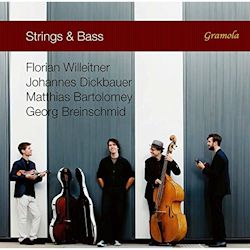 BUY NOW AmazonUK AmazonUS |
Strings & Bass
|
Strings & Bass
Florian Willeitner: O(s)iris [8:00]
Georg Breinschmid: 5/4 [7:58]
Florian Willeitner: Valentinair [15:09]
Georg Breinschmid: Spring [8:16]
Johannes Dickbauer: Welcome to the World [5:45]
Georg Breinschmid: Interlude [5:37]
Georg Breinschmid: Kreizal [5:08]
Florian Willeitner: Impressione #3 [3:29]
Johannes Dickbauer: The Very Last Universe [8:04]
Traditional: Farbenspiele - The Parting Glass [4:23]
Georg Breinschmid: Schattara [5:02]Florian Willeitner (violin): Johannes Dickbauer (violin): Matthias Bartolomey (cello): Georg Breinschmid (double bass, bass guitar)
rec. 4Tune Studio, Vienna, January 2016
Lest one should note the tautologous nature of the album title it serves to remind the listener that the group of like-minded musicians is not a conventional string quartet: rather the viola is replaced by a double bass so the two violins are now pitched against the low-voiced cello and bass.
The music varies stylistically but it’s largely non-improvisational. The tangy folkloric strain is seldom far from the centre of the matter as the opener O(s)iris shows. The title may be modish but the music’s Celtic-sounding with a melancholy central panel and elements that are more classically conceived. The evocative textures and 5/4 rhythms of – you’ve guessed it – 5/4 with a carpet underlay of bass pizzicati are also very listenable. By far the longest track is the 15-minute Valentinair composed by violinist Florian Willeitner, the man responsible for most compositions and arrangements in the set. If I detect a bit of punning here – Willeitner Air, maybe? – then I wouldn’t be at all surprised as there are traces of filmic Irishry here too but also a freshness of spirit. It unfolds like a series of jig variations with embellished counter-themes and a plangent and very attractive return to the warmth of the opening theme.
Spring is couched in portamento-sweet style and alludes to the Londonderry Air, something of a Leitmotif in an album much taken by the Irish folk muse. The bass playing here is acrobatic, the violin pirouetting proudly. Rightly, Welcome to the World is suffused with a joyful spirit though it admits one or two snarky sonorities, abetted by lots of pizzicato-percussive playing. If Interlude seems to draw on Bluegrass then there’s a funky, rocky vibe to Kreizal in which Jimi Hendrix makes a tangential appearance – the only overtly 60s throwback moment: for a moment Nigel Kennedy’s Hendrix explorations seemed to loom but fortunately they’re not pursued too deeply or too far.
Impressione No.3 is a light classical Romanza whilst The Very Last Universe seems to balance the twin poles of rock and romance quite adeptly. The sleeve note writer seems to have taken on board too much of the amber nectar if he thinks that Auld Lang Syne is Irish but fortunately the group essays The Parting Glass, which clearly is, and it receives a reading both slow and burnished. There’s a rather strange ‘bonus track’ - strange because I don’t know why these things are called ‘bonuses’ and also because this send up of the Viennese waltz – with its associated croaky singing – sits very poorly in the context of the album as a whole.
This is a difficult album to pin down, given that it travels in several different directions without being wholly stylistically omnivorous. If you’re sympathetic to the element of folk and not alienated by some of the other cross-currents you may well enjoy it.
Jonathan Woolf